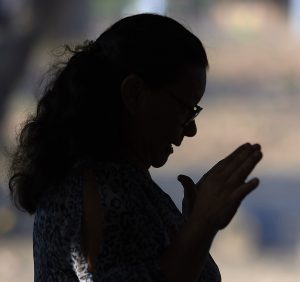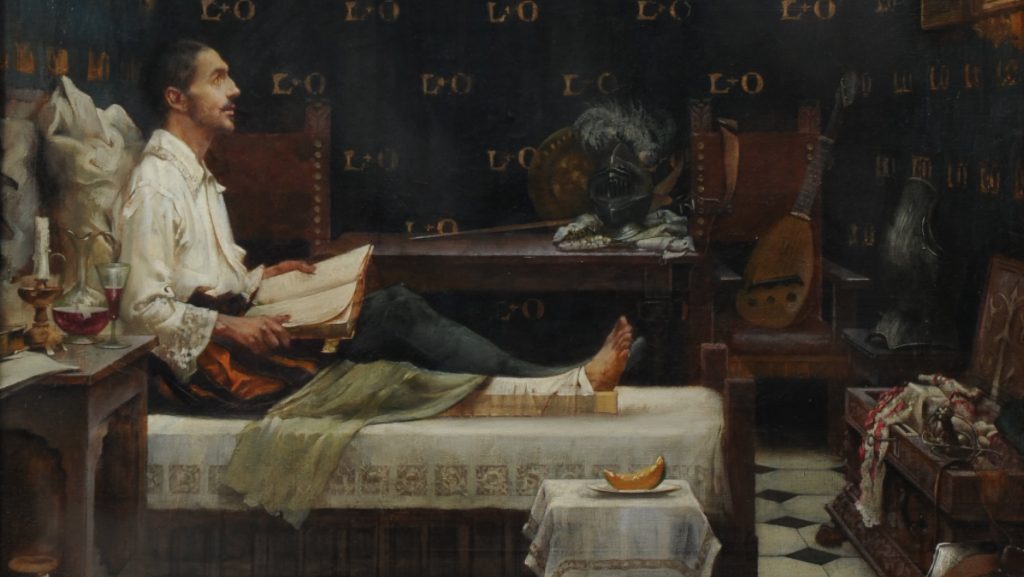Jessie Tappel and her colleagues have noticed a set of common symptoms reported by their patients since the onset of the coronavirus (COVID-19) outbreak: Among them are increased rates of depression and anxiety, high levels of stress, the resurgence of addictive behavior, and symptoms usually associated with grief.
“Many patients have lost weddings, funerals, graduations, jobs, and health” she noted. “They are making huge sacrifices during a time of crisis and general instability.”
Tappel, a licensed professional counselor for the Alpha Omega Clinic in Bethesda, Maryland, and a member of the clinical faculty at Divine Mercy University in Sterling, Virginia, has also seen an uptick in what she terms “compassion fatigue,” or exhaustion that results from failing to care for oneself in order to meet the needs of others.
“You can’t give what you don’t have,” Tappel said. “You may not be able to do things as you were used to doing them, since this time has provoked many trauma-related experiences. Exercising patience with yourself is critical.”
Her observations follow national trends. As reported earlier this month by Angelus, the Centers for Disease Control and Prevention (CDC) has said that one-third of American adults report feeling anxious and depressed, and some researchers are anticipating an increase in suicides and overdoses, also known as “deaths of despair” as a result from the economic collapse, fear of the virus, or the prospect of unending isolation.
While public-policy officials and epidemiologists have discussed the phenomenon of herd immunity to the biological effects of the virus, no one is immune to the psychological and spiritual toll it exacts.
Many Catholics have shared that their hardships have been compounded by their inability to regularly attend Mass or find support through their parish or school community.
“It really is a sense of deprivation,” Seattle-area Catholic Sarah Bartel told “The Washington Post” back in March.
This is not surprising: Research suggests a strong correlation between religious practice and happiness. The Pew Research Center found that in the United States, regular engagement with a community or congregation also corresponds with better overall health.
A pressing challenge is for priests and lay ministers to find ways to accompany people through this experience given the need for social distancing.
The magnitude of this moment has not been lost on one spiritual director, Father Casey Beaumier, SJ, director of the Institute for Advanced Jesuit Studies at Boston College. Father Beaumier, who also serves as vice president and university secretary, said that the students he’s been in touch with since the lockdown have been thrust into a spiritual crossroads.
“This is the first big disruptive event for this generation,” Father Beaumier commented. “Part of the cost of this time of lockdown has been that people have had to be alone with themselves. They are asking, ‘What do I do when I’m not going, going, going?’ ”
Father Beaumier said this is a profound moment for people of all ages who are learning how to be “alone with themselves and be OK with that.” He expects that for some, this will be a period of self-discovery and a deeper knowledge of God. For others, it will be a time marked by desolation and anguish.
“Ideally, people will discover that our faith has tremendous resources outside of Mass,” Father Beaumier said. “If my spiritual life was dependent on one hour a week, and that hour was taken, I could despair in that, or I could face that reality and discover that there are many other things in Catholicism that can help me grow.”
One such saint he recommended getting acquainted with is St. Ignatius of Loyola, whose feast day is celebrated on July 31.
St. Ignatius is an apt guide for those suffering from illness, despair, or isolation. His own conversion took place in the context of an injury he sustained in battle. While recovering in solitude, he had ample time to dwell on the reality that he would never walk properly again. It was a time of grief.
To add salt to the wound, the books he sought for consolation weren’t available to him. The only ones on hand were about the life of Christ and biographies of the saints. It was this reading material that led to his conversion and inspiration to found a new religious order.
St. Ignatius is known for his acute insights into human emotions, thoughts, and motivations: His own were the subject of his study while recovering.
William Van Orum, a professor of psychology at Marist College, has written that St. Ignatius might be considered a forerunner of cognitive behavioral therapy, which is a method of therapy that is aimed at helping a person to become cognizant of negative thinking and to develop more effective ways of thinking about difficult situations.
According to Ignatius, a key factor in changing one’s mindset is gratitude. “I will call back into my memory the gifts I have received — my creation, redemption, and other gifts particular to myself. I will ponder with deep affection how much Our Lord God has done for me, and how much he has given of me of what he possesses, and consequently how he, the same Lord, desires to give me even his very self, in accordance with his divine design,” he wrote after having moved from despair to hope during recovery.
Most people get acquainted with St. Ignatius through his magnum opus, “The Spiritual Exercises.” While they are normally undertaken on retreat and under the direction of a spiritual director, during this period of social distancing people can read them or follow a few select practices.
One practice would be to use one’s imagination in prayer. Father Beaumier suggested that at a time in which we are deprived of relationships and human contact, we might focus on what St. Ignatius called the colloquy, or an intimate conversation with God.
In the “Exercises,” St. Ignatius suggests that the retreatant share his intentions, thoughts, desires, and emotions with Mary; then he is to imagine Mary walking alongside him as they bring those things to Jesus. Finally, the retreatant should envision Mary and Jesus walking with him to bring those same intentions to the Father.
Considering prayer as an intimate, relational conversation is one tangible way to experience the communion we temporarily lack.

Additionally, Father Beaumier suggested that Catholics keep in mind the saint’s counsel to “interpret everything in the best light possible.” While this was meant to guide spiritual directors in how they interact with those in their care, he thinks it could benefit family members in their exercise of charity toward as well as serve as a challenge to those who are considering this period as devoid of hope.
“This speaks to us in circumstances in which we feel abandoned and at a loss,” Father Beaumier said. “In a mysterious way God is at work even at a moment when it feels like everything is falling apart. The fruit of that is reassurance when we feel like things are out of our control. It doesn’t take away anxiety, but it contextualizes it. We can say to ourselves, ‘This is a moment that will be overcome in the course of time.’ ”
Finally, Father Beaumier recommended considering the whole path of “The Spiritual Exercises,” which takes place over four weeks. “All roads lead to Easter,” Father Beaumier said, “but you have to go through everything else to get there.”
In other words, during this time of the pandemic, believers must continue to look forward in hope to life beyond our present circumstances, while also acknowledging what they are feeling and going through. “We can’t rush Jesus through Gethsemane,” he said.
Tappel would agree with that approach. “Checking in on your own emotions and thoughts and being mindful of them are critical, especially in times of stress,” she says.
Tappel is hopeful that her patients and others can overcome the challenges to mental health that COVID-19 has posed.
“I’ve seen how resilient and adaptable people can be. I’m proud of the ways my clients are learning to process and adapt to all of the changes in their lives,” she said.
St. Ignatius knew well that the human condition was marked by periods of desolation and consolation. As Catholics continue on in these trying times, they would be wise to consult this spiritual master for ways to keep hope alive.

